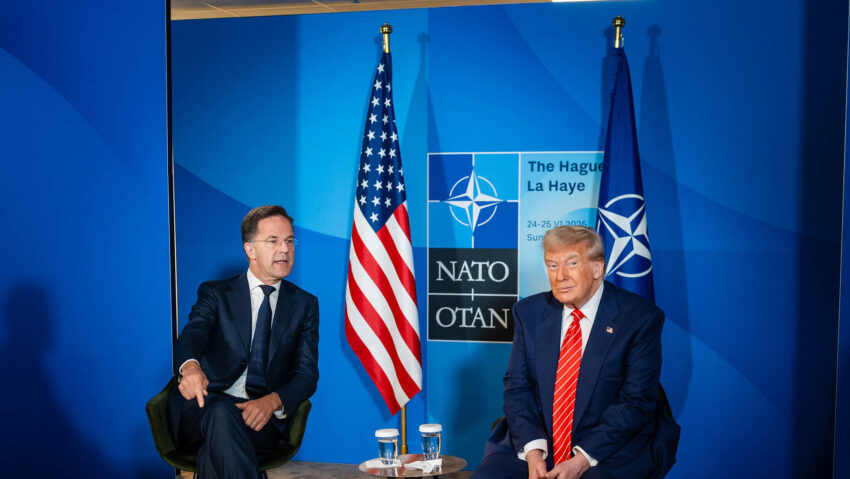NATO Secretary General Mark Rutte and Donald Trump, US President address media at the NATO Summit in The Hague (NATO)
BELFAST and THE HAGUE — President Donald Trump today reaffirmed the United States’s commitment to support NATO nations in the event of an enemy attack, a day after suggesting that the alliance’s mutual defense pact leaves room for ambiguity.
“We’re with them all the way,” Trump told reporters this morning in a briefing with NATO Secretary General Mark Rutte, praising a plan by the alliance to ramp up defense spending to 5 percent of GDP by 2035 amid pressure from the White House. “NATO is going to become very strong with us,” he added.
Later in the day he told reporters that he was leaving the summit feeling “a little bit differently” than when he arrived, because of the “love and the passion” NATO allies’ heads of state showed for their countries. “I’ve never seen quite anything like it. They want to protect their country, and they need the United States and without the United States, it’s not going to be the same.”
Trump raised uncertainty about America’s willingness to defend Europe from aggression, telling reporters aboard Air Force One on the way to the summit Tuesday that NATO’s Article 5 clause, which asserts that an attack on one member of the alliance is an attack on all, has “numerous definitions.” The American president’s comments threw a wrench into the event — typically choreographed well ahead of time to project unity — that is already strained by disagreements among NATO countries on the plan to increase defense spending.
Prior to Trump’s comments reaffirming America’s commitment to Europe’s defense, several heads of NATO states directly pushed back, asserting that the mutual defense pact leaves no room for interpretation.
“Article 5 is when somebody attacks you, NATO will help and defend you,” Dutch Prime Minister Dick Schoof told reporters on the doorstep of the NATO summit when arriving here this morning. “I think Article 5 is very clear.”
The Netherlands and the United States go way back. As good friends, trade partners and allies. Today NATO took historic decisions that will strengthen the alliance and our collective defence.
Thank you @POTUS for coming to the Netherlands and for our solid cooperation.
Let’s… pic.twitter.com/6J03Of6B9n
— Dick Schoof (@MinPres) June 25, 2025
Finnish Minister for Foreign Affairs Elina Valtonen agreed, stating, “Article 5 is quite clearly spelled out in the Washington treaty,” using the alternative name for NATO’s founding charter signed in 1949.
On the summit’s doorstep, Lithuanian President Gitanas Nausėda said a discussion on Article 5 among NATO members “would be very useful” to clear up any misunderstandings.
“Maybe we need this very frank discussion about Article Five,” Nausėda reasoned, adding that settling on a unified definition would mean “our understanding is the same.”
Some of the strongest comments downplaying Trump’s Article 5 equivocation came from Rutte, tasked with the uneasy job of steering the alliance amid uncertainty stemming from the Trump administration. Rutte stressed that America’s commitment to NATO’s defense is ironclad but appeared to introduce some vagueness of his own.
“For me, there is absolute clarity that [the] United States is totally committed to NATO, totally committed to Article Five,” he said at the NATO doorstep. “The big thing about Article Five, and the good thing about Article Five, is that it is clear that we defend each other when we are attacked, but you will always get all these questions you ask, but if this cyber-attack or this hybrid attack? We never go into those details.”
Rutte then hailed Trump, who has demanded NATO allies invest more in their security, for spurring European countries to step up on defense spending. The secretary general told reporters he was “totally fine” with Trump sharing an effusive private message sent by Rutte that credited the American president with fostering the conditions for the 5 percent GDP defense spending plan.
“Would you really think that the seven or eight countries not at 2 percent at the beginning of this year would have reached the 2 percent if Trump would not have been elected President of the United States?” Rutte asked. “What is in that text message is a statement of fact.”
Spain’s notable exception to the pledge also earned Trump’s ire. “They want to stay at 2 percent, I think it’s terrible,” he said. “They’re doing very well. The economy is [doing] very well and that economy could be blown right out of the water with something bad happening.”
Stressing that negotiations with Spain over a new trade deal are ongoing, Trump said, “We’re going to make them pay twice as much.”
Tony Lawrence, head of the defense policy and strategy program at the International Centre for Defence and Security, an Estonian thinktank, told Breaking Defense that Trump’s commitment to Article 5 is “clearly a positive outcome from the summit,” as the “main aim was to avoid a transatlantic blow up.” Trump’s message was a “bonus,” he added, but “at the same time, he said something a little different yesterday.”
Lawrence also shared that Rutte seemed frustrated by the many questions he had to respond to on Article 5, judging his emotions, which is “evidence that the European allies remain wary” of Trump. “On a more practical note, the defence spending agreement shows that the European allies recognise the need to do more,” even “perhaps” without Washington.
Click this link for the original source of this article.
Author: Tim Martin and Michael Marrow
This content is courtesy of, and owned and copyrighted by, https://breakingdefense.com and its author. This content is made available by use of the public RSS feed offered by the host site and is used for educational purposes only. If you are the author or represent the host site and would like this content removed now and in the future, please contact USSANews.com using the email address in the Contact page found in the website menu.








